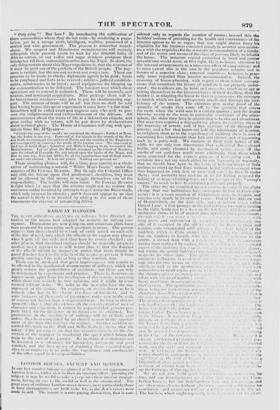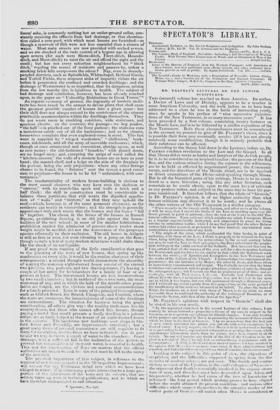LON DON ii()USES, A NCi EN T AND )1(11)F.IIN.
IN our InA imtIimmhiii litil 0111. wi glaneeit at tilt' 0111 ‘1arli Itipearance of London houses, with a \ it'W lilt lm,mm ititi OreS,1110 tin." Pursuit"' the subject, it may be mu m litl to take a peep into their interior arrange- ment, having an ye to the useful as well as the ornametteil. The great OlaSS of Ordinary 1.011a1011 am IVO/ • hOOSOS, more part iculady those H n busy thoroughthres, are built to be let, its the .1cw's raeors were made to sell. 'Ile tenant is a rate-paying abstraction, that is con- sidered only as regards the number of rooms; beyond this the builders' notions of providing for the health and convenience of the inmates appear to be so vague, that one might almost fancy his eligibility for his business consisted mainly in an utter unacquaint- ante with the requisites for the domestic accommodation of' a tionily, and of the wants and means of the class of persons likely to inhabit the house. The immense capital embarked in brick and mortar speculations would seem, at first sight, likely to insure attention to the internal arrangements as a necessmy ellOct of competition : and to sonic extent this is the case in the populous suburbs and in houses of' a superior class; external smartness, however, is gene- rally more regarded than interior accommodation. Indeed, the economy of house-planning, with regard to those minor conveni- ences that constitute the luxury of cond'ort, is not properly under- stood : the residents are, by habit and necessity, much inure apt at suiting themselves to the inconveniences of their dwelling, than the builder is at adapting the house to their requirements: the attempts to furnish which are not unfrequently maoilested through the inef- ficiency of the means. 'fhe chimnies give ocular proof of the quantity of smoke they carry oft; by the quantity that enters the room when the wind sets in a certain quarter ; and the drains likewise testify to the nose, in particular conditions of the atmo- sphere, the share they have in ministering to health and cleanliness. Our ancestors required a depopulating plague to convince them of the necessity of sewers, and of free currents of' air through the streets ; and a fire that burnt out halt' the inhabitants of' London, to enlighten them as to the expediency of building their buses of something less inflammable than lath anti plaster, and of' separating each by a party-wall. We exclaim at their rude habits of life, while we are only now discovering that cylindrical flues, glazed inside, and easily cleansed by mechanical means, carry off' the smoke of our coal-fires much more effectually than those which seem contrived for the express purpese of hat beuring soot. It certainly does not say much either thr our humanity or ingenuity, that we should have been in the habit of training troops oh' little urchins to crawl up foul flues without being stifitTd—except when they happened to stick filst, or were sullhcatiel by tires lit under them; and posterity may excleim at ins fir having required the baking of so many climbing-boys, and the ravages at the e sweep's cancer," to teach us how to construct a cLimet.y properly. 'file other day we stumbled upon It curious hue ance of the slight change that our habitations have undergone in two or three cen- turies : it is a town mansion of' Elizabethan style. in Aldgate, and remains very nearly in its original state. Out of the Aldeate end of Iloundsditch, on the cast side, runs a narrow coo, t called Gravel Lane : a foot-passage at the end bets Ceti two wales. turning to the right, leads you to a door on the left il, which the carved architrave shows to be of ancient date. Opt-11:1' Z int0 11 paved court ; through you cutter a sp.., -
long grass, and surrounded by e. , with side of it occupied by the old !, and regular, only ornamented with of the wilich is three stories Lie.. and has six windows in length, with tee .set• io the
centre, a carved door with a 1,n 1. easee,r tead nts
having been replaced by eoluto. •'- .ts : elance; aspect of the building tit nethoz but within, the quaint fashion et' t:: es: est ,ushed, bespeaks its olden date. 'fhe
cuntbron, hallusters, is so close sage into the two rooms on the E. esh side; o huh, as well as the apart:ie.:es s. .!'t s\t‘eitrh:
the chimney-pieces are nal. wainscoting in small square se. inlaid with bosses of marl de : heavy mouldings in comparent :1:-. t • 's!etna- ticel de, ives. The apartments no- , dark: there being no back-rooms. ues : the
chambers above leis a eiedsw
., slate. :liet is the only aperture through . The gr.etisi-tloor armee . it= • only a s, P a eeesth : ths hou,c to H..1 the polsct
omate Lite e.• F.soreshat
in the Ttmcr. It was tr.t st .• citizen, or porh.ips of a „
. the To%■ cr. being then a ce,.1 ocetyied by a pers,sn coe may be see:tele:I es a SP.
iii .4 OW it)" L•71117kiniled t7.1 set.% ing, for the d,"or.g
work, and the r •
tion. It 'silt rev:1■
. v: efor
. calthy to v was , end s:reing , ''it i6 ii
p -
..111entti
'
:1:1V
liness' sake, is commonly nothing but an under-ground cellar, con- stantly receiving the effluvia from bad drainage, or that abomina- tion called a cess-pool, with which most houses are furnished—as though a reservoir of filth were not less essential than a cistern of water. Most main streets are now provided with arched sewers, and we are shocked at the rude custom of a bygone age in allowing open sewers (for such were Shore-ditch, Fleet-ditch, Hounds- ditch, and Moor-ditch) to taint the air and offend the sight and the smell; but has not every suburban neighbourhood its " black ditch," regaling the senses of residents and passers-by, unless a smoking brick-kiln overpowers the odour ? Nay, even in densely- peopled districts, such as Spitalfields, Whitechapel, Bethnal Green, and Tuthill Fields, these stagnant sinks of impurity vitiate the air before it penetrates the confined and crowded dwellings : and the drainage of Westminster is so imperfect, that its dampness, arising from the low marshy site, is injurious to health. TI•e subject of bad drainage and ventilation, however, has been already touched upon, in the paper on " Unhealthy Habitations in Great Towns."* As regards economy of ground, the ingenuity of modern archi- tects has been taxed to the utmost to devise plans that shall cram the greatest possible number of houses into a given space : but their skill does not always extend to the contrivance of the utmost practicable accommodation within the dwellings themselves. They do not waste room in rambling corridors, wide staircases, and spacious closets ; on the contrary, the passage— we beg pardon, "the hall."—is pinched out of the front parlour; the staircase cuts a monstrous cantle out of all the backrooms ; and as for closets, housewives complain that even cupboard-room is scant. This last want is supplied by " winged wardrobes," " chiffoniers," book- cases, sideboards, and all the array of moveable enclosures; which, though at once ornamental and convenient, abridge space, as well as cost money : the old-fashioned "beaufets," with glazed doors, are no longer seen ; and, excepting the strips of wood called the "kitchen-dresser," the walls of a modern house are as bare as your hand; the mantel-shelf, and a ledge on the side of the fireplace in the parlour, being the only projections : where any other fittings chance to be found, the '• fixtures" cost the tenant a good round sum to purchase—the house is to be let " unfurnished, with con- veniences."
The insubstantiality of modern house-building is obvious to the most casual observer, who may have seen the skeleton or "carcass," with its match-like spars and walls a brick and a' half thick : the skill in construction must be considerable to balance these partitions, that still retain the dignified appella- tion of " walls" and "timbers," so that they may uphold the roof,—which, however, is of the same gossamer character, as the residents can testify in winter-time ; and the strength is generally apportioned with such nicety that the houses and the leases " fall in" together. The clause in the leases of the houses in Russell Square, prohibiting dancing, is an old joke against the house- builders of the new school: in some of the smaller habitations a prohibition against the admission of persons above twelve stone weight might be needful, did not the narrowness of the gangways operate effectually to their exclusion. The old house in Aldgate is still as firm as ever, not even vibrating to a jump on the floor; though so rude a test of many modern structures would shake them like the shock of an earthquake.
If any proof were wanting of the little consideration that goes to the planning of the rows of' new houses, that spring up like mushrooms on every side, it would be the routine character of their arrangements : a second thought would demonstrate the absurdity of making the common eight-roomed house consist of the eternal two kitchens, two parlours, and two drawing-rooms, (!) leaving a couple of low attics for bedchambers for a family of four or six persons at least. The ten-roomed houses are less incommodious by two small chambers ; but in neither of these two sorts, the most numerous of any, and in which the bulk of the middle-class popu- lation are lodged, arc the obvious and essential accommodations for a family provided. Even in many of the principal thoroughfares, such as Oxtbrd Street, the Strand, Cheapside, and Cornhill, where the rents are enormous, the inconveniences of some of the dwellings are extraordinary. The situation for business being the grand consideration, all others give way : the wealthy tradesman has his country -itense, but those who cannot afford this luxury, though paying a motel that would procure a lordly dwelling in a private street. ers as badly lodged as the tenant of an eight-roonieri house in the burij. The handsome new buildings over shops in Ox- ford Street aod. PH:wilily, are improvements exteriorly ; but a great elan?' e,esenal convenience are still requisite to fit
them for those we have indicated : one in par-
ticular we r:.% • ,a a supply of water to the chambers. Good drainage, -:.t fall in the inclination of the glitters to
prevent the fi of stagnant water, is essential to health. Ibis and the co:. r. of flues are matters that the official
authorities are ho a th, arciiiteot,
The pra.:tioal numher of riew 1.', will ezorise the Obliged to enter :
portion t . seldom taker, a.
have ft:.' • Spedalio, i,, 62f.t. U, : the rest must be left to the mercy
importer.e.e of this subject, in reference to the i rue lu t: el in the .!.letropolitan Improvements, f..tilitarian detail into which we have been many points interesting to a large pro-
: . the town and its iiiiburbs, that are
,,•1. technical publications, and to which we :eav,..'.terl to call attention.



























 Previous page
Previous page